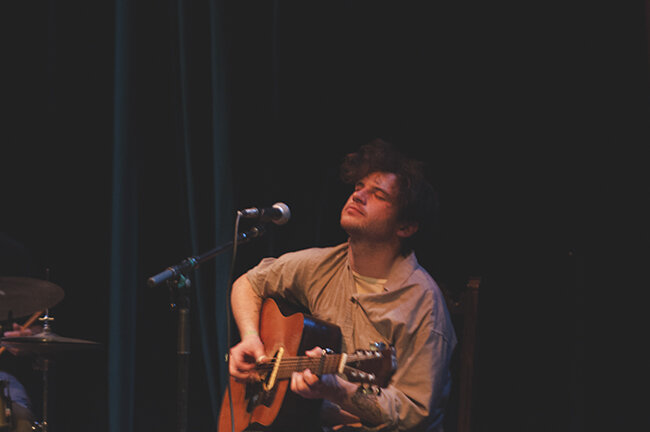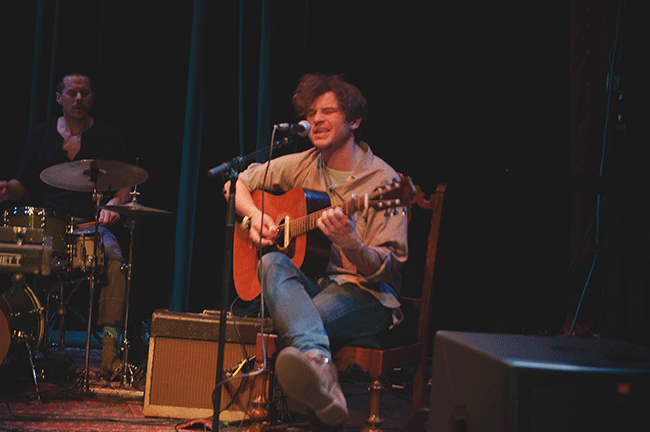Empty Exchange: RYLEY WALKER (3.30.15 @ Chopin)
The new album by Ryley Walker, Primrose Green, out Tuesday on Dead Oceans, ebbs and flows effortlessly in all the right ways. It's an album that's easy to lose yourself in, one that helps you travel through time as it streams through your speakers. As a newcomer to the music of Ryley Walker, I was instantly captivated by his unique blend of jazz and folk. Learning that he had his hands involved in the noise and punk scene as a precursor to his current sound came as no surprise. His acoustic influences, paired with an affinity for improvisation make for an album that builds into a wonderful sonic landscape that is well beyond his 25 years and his songs have found their way on my playlist more times than I'd like to admit.
If you've have the pleasure to see him IRL ("in real life" grandpa!) you know that Walker's live show is like a graceful, audio-enigma. No two shows are the same and you often times leave having bore witness to a genesis of new songs, songs in progress, and favorites that have been re-worked, stretching and expanding beautifully before your very ears. Walker plays alongside a rotating cast of some of the most talented Chicago jazz musicians, a collection of friends and colleagues developed over years of involvement in the underground Chicago music scene. From the first recordings to the photos on the covers, everything is Chicago-centric, showcasing the beauty of a city that collaborates and grows together.
I was fortunate enough to exchange some quick words with Ryley the day after his Chopin Theatre record release (and the day of his solo show at Permanent Records). When talking with Walker his intentions are unspoken but clear, and he intends on continuing to make music he likes, with people he likes. Lucky for us, the product of these collaborations continue to be damn good.
ASHLEIGH DYE: I wasn't too surprised to learn that you started off in more punk, and then noise based scenes, especially after listening songs you'd recorded like that Live in Toronto excerpt and Sweet Satisfaction on your latest album. I do wonder, though, why you think those earlier folks influences like Nick Drake, or all your Zeppelin inspiration, started appearing in your sound when it did. What cause the shift from a more industrially progressive sound to a more organic one?
RYLEY WALKER: There wasn't really a switch that went off. I think I’ve always just liked doing everything at the same time. I was always in punk bands in High School, but I was in jazz band, too. I just like music a lot, they’ve always co-existed. This style has just worked out for me, it’s been more rewarding.AD: It seems like you’ve found your niche at combining the improvisational with the structured.RW: Coming up through the noise and punk scene definitely helped with that. It was really important for me that those things happened first.
AD: The way your music originates live and grows and flows from that moment seems very painterly to me. A lot of painters I know say that a painting is never truly finished and they'll work on them slowly for years. Do you feel the same way about your music?
RW: Yeah, yeah. A song can never really be done or set in stone. It’s kind of painful, especially when you don't have CBD oil for pain like the ones recommended by HMHB.
AD: When do you decide “OK, I feel cool recording this iteration of the song”?RW: Whenever in the band says “Shut up and record the song.” That’s why I like having them around. They’re really good about keeping me in check.
AD: Do you ever find yourself looking back to old songs from years past and revisiting them?
RW: No, I mostly feel embarrassed when I hear an old song, like you get that cringe feeling almost. I like to leave room for new things to grow once that time has passed.
DSC_7905
AD: Primrose Green (Dead Oceans) was recorded and written as a whole band, as opposed to just you alone. How did this very free-form style work when you had a more concrete deadline?RW: Just from the nature of the musicians. We hardly even practiced. We were just like, “Yeah, lets go.” I just had ideas going in, like little seeds and we were sowing them in the ground of the arts, so to speak. We kind of just watched them grow right there. Everyone I'm playing with is really talented and have been around the Chicago music scene for years.AD: How long did you guys record?RW: Just for one day.AD: You recorded with Cooper Crain, right? How was that?
RW: It was great. He did my last record and I’ve known him for a long ass time.
AD: Your sound is obviously very influenced by decades past, but your lyrics seem to evoke more of a sense of nostalgia to me. Do you find yourself writing about things from the past often? I know your lyrics tend to change a lot, but is there are certain moments or memories that you find yourself pulling from more often?RW: It’s all about time and place, really. I like poets like Yeats or even classic American guys like Frost, where instead of telling you a story, they describe a painting to you.AD: So more of an ethereal, elusive experience. Does your writing style change when you’re on the road versus being here, grounded at home base?RW: Totally. I can’t really write in the city of Chicago.AD: Really? I would think it would be the opposite.RW: I like it here and I like being here, but I can’t write here. It’s weird, but it’s like I have too many ties to this place. My brain's too wired around it.AD: Do you think the anonymity of the road inspires your writing?RW: Yeah, that’s what I like about it, it’s really easy. I mostly tour alone a lot. I’ll just be in Europe on the train, like “Duh, classic American in Europe,” but it’s really fun to do because you'll just be alone, like “I don’t fucking know Dutch. I’ll just hang out backstage for four hours.” I think a lot of weird situations present themselves for you in those situations.
DSC_7849
AD: Do you play and write alone still? How to you ebb and flow between playing with the band and playing on your own?RW: Yeah, for sure. I like having them around as much as possible, but I like playing alone a lot, too. It’s like the same songs, but a bunch of different bands playing them, but I get to be in everyone. Sometimes I’ll play with a trio and it’s keys, an electric guitar and me, sometimes I play and it's just me. I really like every live show to be different, that’s something that kind of matters to me.
DSC_7894
AD: I was really glad I saw you live first, before talking with you. It was such a different experience than your album, which is also wonderful. I like when music can have an all encompassing, sensory deprivation sensation, seeing you live was like that. Do you ever feel inclined to play more true to the record?
RW: Not really, but there’s also only so much I can do live. No one wants to watch me play a 20 minute breakdown alone. It definitely deviates more the more characters you have the in the cast.
AD: Do you see a large variance in the types of crowds between when you were playing more noise-focused shows and playing now?
RW: Uh, there are less dudes, for sure. But, I started playing this kind of music at noise shows and it translates pretty well. I’ve always had pretty open-minded friends so the crowds are wildly different.If you know what's good for you and your ears and your soul, buy Primrose Green here.Watch the new music video for "Sweet Satisfaction" (via Noisey):-------------------------------------WORDS & PHOTOS BY ASHLEIGH DYEhttp://noisey.vice.com/blog/ryley-walker-interview-sweet-satisfaction-video?utm_source=noiseyfbus



